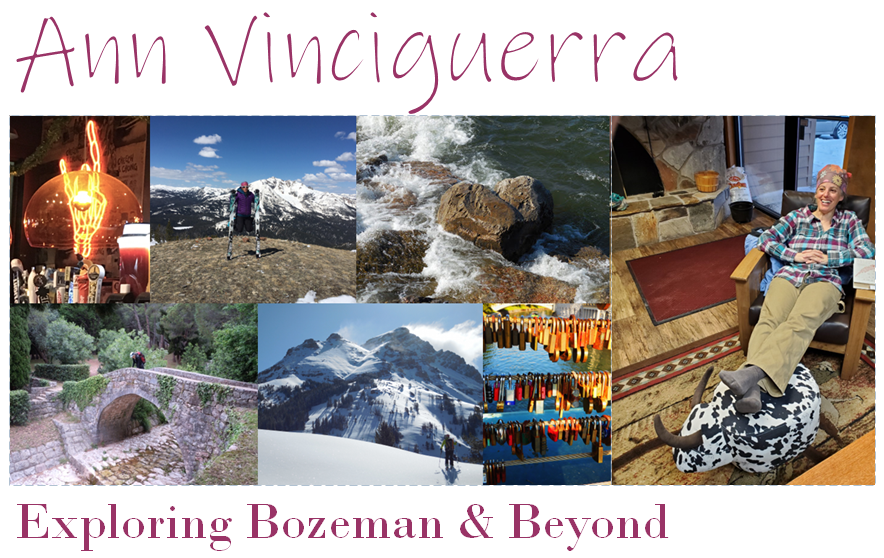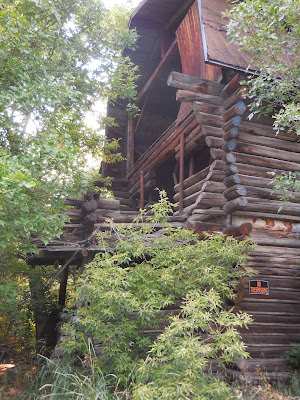 I first jotted down some notes on this topic in March and delays during a recent flight allowed time to revisit it. Summer is a busy time for building and reminded me the issue of how Bozeman grows is a heated one. I'll post this now rather than waiting to get my thoughts perfect. Feel free to add your thoughts (And photos) to the conversation.
I first jotted down some notes on this topic in March and delays during a recent flight allowed time to revisit it. Summer is a busy time for building and reminded me the issue of how Bozeman grows is a heated one. I'll post this now rather than waiting to get my thoughts perfect. Feel free to add your thoughts (And photos) to the conversation.~
With rampant development, increasing traffic, and an ever-quickening pace of life, there’s no doubt about it, Bozeman is a fast growing and quickly changing town. Here, you’ll find lots of people grumbling about the downsides of recent development, and while I agree there are growing pains as town evolves, I firmly believe all is not lost. All you have to do is take an Alley Tour, a quick wonder around Bozeman’s alleys and backstreets.
Some time each February I take my first Alley Tour of the season. This late-winter tradition is an excellent way to see first-hand that, despite everything, Bozeman is still a lively mountain town with dynamic personalities and pockets of rugged charm. After an Alley Tour, I am reminded Bozeman’s distinctive character, which drew so many of us here in the first place, is still alive. I walk away convinced that despite an ever-gentrifying landscape, it will take a lot to kill Bozeman’s spirit.
As I explore the back passageways, dirty piles of snow
stubbornly cling to the ruts down the alley leaving a trail of snow, mud, and
puddles to navigate. Between the muck under foot and the dwindling daylight, early
evening in late winter is an ideal time to explore the alley. Unlike during the
middle of a sunny day, there is no glorious big sky to distract from the
scenery at hand helping assure the experience is ideally atmospheric. Under steel
grey skies, the graffiti seems gruffer and angrier, and abandoned cars, vans,
bikes, and boats appear more abundant. Derelict buildings appear more run-down,
and disheveled properties seem a little more edgy.
 As I walk, I notice the variety of houses lining these
passageways, a treasure-trove of ramshackle properties, cluttered yards, unique
dwellings, and ordinary abodes as well as a few stylish residences. Many of the
homes are old. Some appear to be sliding off their foundations into the earth
while others appear to have no foundation at all. Other houses are faded stars,
once attractive homes allowed to fall into disrepair. Their elegant porches and
woodwork still remain but sag and peel with neglect, their beauty and charm a
thing of the past. Joining the mix are slap-dash masterpieces, small abodes with
random add-on wings and a variety of yurts, sheds, and structures to expand the
usable space. And thrown in here and there are remodeled houses, their angular
metal-enhanced facades and bright colorful paint offer a striking contrast and
a subtle reminder that Bozeman is changing.
As I walk, I notice the variety of houses lining these
passageways, a treasure-trove of ramshackle properties, cluttered yards, unique
dwellings, and ordinary abodes as well as a few stylish residences. Many of the
homes are old. Some appear to be sliding off their foundations into the earth
while others appear to have no foundation at all. Other houses are faded stars,
once attractive homes allowed to fall into disrepair. Their elegant porches and
woodwork still remain but sag and peel with neglect, their beauty and charm a
thing of the past. Joining the mix are slap-dash masterpieces, small abodes with
random add-on wings and a variety of yurts, sheds, and structures to expand the
usable space. And thrown in here and there are remodeled houses, their angular
metal-enhanced facades and bright colorful paint offer a striking contrast and
a subtle reminder that Bozeman is changing.
If I let me imagine run wild, I feel transported into a
scene straight out of the movie Scrapple.
In my vision, ski lift operators, bartenders, and house painters would rent
these old battered homes for cheap. Allman Brothers tunes would be floating out
of the windows and friendly stoner types, like the Scrapple characters Al Dean, Tom, and Errol, would be sitting on
the porch exuding a palpable sense of good cheer. No one would be too busy or
overly concerned with life, and everyone would be fully engaged with their
fellow porch-mates and give a hearty hi to all who pass by.
 Although the scenery I pass harkens back to the halcyon ski bum days of yesteryear, it’s not 1970s Bozeman, it is an early evening in February 2017
and people are scarce. I am stricken with a keen sense of nostalgia and curiosity.
Who on earth collected all this junk? What was Bozeman like in the 1970s when
the population was under 20,000, trendy boutiques were rare, and Bozeman wasn’t
on any top-ten lists? With new restaurants, increased art and cultural
offerings, and an expanding job market, is 2017 Bozeman really that bad?
Although the scenery I pass harkens back to the halcyon ski bum days of yesteryear, it’s not 1970s Bozeman, it is an early evening in February 2017
and people are scarce. I am stricken with a keen sense of nostalgia and curiosity.
Who on earth collected all this junk? What was Bozeman like in the 1970s when
the population was under 20,000, trendy boutiques were rare, and Bozeman wasn’t
on any top-ten lists? With new restaurants, increased art and cultural
offerings, and an expanding job market, is 2017 Bozeman really that bad?Smaller and less diverse but quiet versus bigger and more vibrant albeit with more people and traffic, what is the right answer for how Bozeman (Or any area) should grow? So many questions to ponder as I wonder the alleys in the vanishing daylight of late winter. There are no easy answers but I am hopeful.
I encourage everyone, especially if you’re feeling jaded about
“all those people” moving in and “ruining” Bozeman, to take a late winter walk and
roam Bozeman’s alleys and passageways. Here you’ll find a mish-hash of original
and repurposed, quirky and classy, odd and ordinary. It is here, in Bozeman’s
alleyways, you can find a clear reminder of the free-spirited part of the
city’s identity.
What follows is the ideal Alley Tour. Strap on your Yaak
Trax and gaiters, it’s alley season and Bozeman’s backstreets are calling.
1)
Start your Alley Tour at the abandoned train
tracks at the east end of the Ale Works parking lot near the Village Downtown. Start
on the southern sidewalk that enters the development and leads to a path behind
the Georgetown-style townhouses. You’ll quickly get to a short stretch of an old
rail track with an old trestle perched above grassy, seemingly wild lands. Birds
and deer are regularly spotted here, and it’s not hard to imagine many a fox,
rabbit, and other critters inhabiting the area. The old rail line ends abruptly
above actual train tracks near the interstate and the Story Hills. Graffiti is
sprayed on these train remnants, a few beer bottles are strewn about, and
homeless folks have been known to gather here to spin tall tales and take in
the scenery at the edge of town.
From here, backtrack to the original
path and traverse to your right, towards the Village Downtown’s multi-story
condo building. You’ll head down the sidewalk to a fire lane taking you behind the
condos to the Simkins-Hallin lumberyard. This light industrial complex provides
a contrast to the small patch of nature and posh development. With its endless
piles of lumber and building materials, this thriving business reminds the
alley-walker one is indeed in a growing town. From here, you’ll be deposited on
the odd corner where Peach, Plum and Avocado Avenues all come together. Head
south for the second part of the Alley Tour.
2)
The parameter of part two is between Church and
Broadway and Peach and Lamme. Feel free to explore this part of your Alley Tour
free-format. In some sections, you’ll be without sidewalks, which adds to the tumbledown
atmosphere. Ski area signage, road signs, license plates, skis and bike parts
are commonly used as decoration and piles of junk are commonplace. You’ll find
garage-based biodiesel operations, backyard chickens, and a lot more if you dig
around. There is a sense people with strong personalities live here, these are
not ordinary folks tied to convention.
The book depository on corner of
Church and Fridley marks the end of this section of the Alley Tour. This is one
of several free "libraries" that have started to appear throughout
Bozeman. These depositories allow people to drop off and pick up books. I like
seeing these libraries and mention it here as they are examples of Bozeman’s generous
spirit and sense of sharing, recycling, and intellectual pursuit. The idea of
bringing people and communities together through the distribution of books is a
cool concept. Could a community that embraces this really be ruined?
From the book depository, head
south on Church and turn onto Lamme to get to the final segment of the Alley
Tour.
3) Your Alley Tour ends with a stroll down Perkins Place, located off Lamme between Church and Rouse. Unpaved and narrow, at first glance it appears to be another alley. There is a sign announcing you have reached Perkins Place but one would think the sign was for show, a whimsical way to mark one’s alley. However, it is a real street as indicated by the 10 miles per hour sign and street numbers on the dwellings. Apartment buildings and houses line Perkins Place, many with road signs adorning the exteriors, junk cars lying under tarps, and heaps of bric-a-brack cluttering lawns. Perhaps most interesting is the rambling three-story barn on the northwest end of Perkins Place, not far from where it ends as it hits Peach Street. This Lincoln Log looking structure appears as if a brisk wind or even a mere nudge could send it tumbling into Bozeman creek or onto an unsuspecting alley explorer.

4) Alley Tour bonus extension! Visit the 200 block of West Lamme and observe two small rental white houses and a white eight-unit apartment building. All have fallen into disrepair and are boarded up. Rumor has it another mid-rise condo building will soon replace them. Also visit the parking garage on south side of Mendenhall, between Willson and Grand. Graffiti covers both of these spots and both are curious urban spaces.
5) After
ending your tour, head back to the starting point at Ale Works or drop in at
the Tap Room. Both are fitting places to end your Alley Tour – not just for the
beer, libations and food but also for refurbished nature of these buildings. As
with the area you just explored these places bring together the vast
personalities of Bozeman and the people who inhabit it.
~
~
A similar post (And as of now my second most popular post!): http://annvinciguerra.blogspot.com/2017/01/paradise-ruined.html
Another post about alley touring: http://annvinciguerra.blogspot.com/2017/09/bozeman-touring-midtown.html
Another post about alley touring: http://annvinciguerra.blogspot.com/2017/09/bozeman-touring-midtown.html







No comments:
Post a Comment